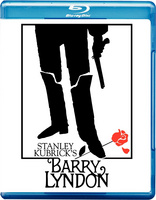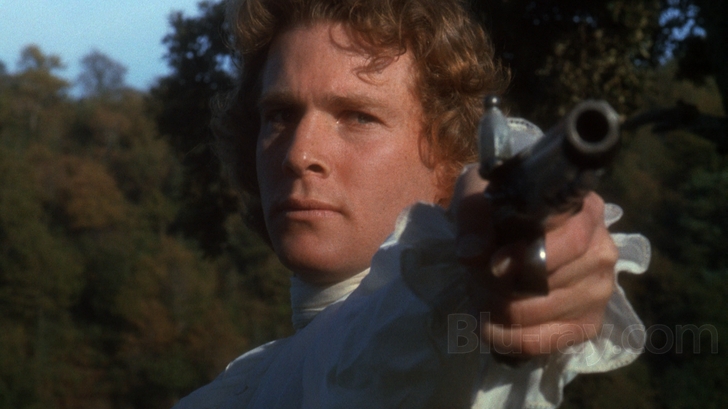Barry Lyndon Blu-ray Movie
HomeBarry Lyndon Blu-ray Movie 
Warner Bros. | 1975 | 185 min | Rated PG | May 31, 2011
Movie rating
8.5 | / 10 |
Blu-ray rating
| Users | 4.5 | |
| Reviewer | 4.0 | |
| Overall | 4.0 |
Overview
Barry Lyndon (1975)
Redmond Barry is an Irish country boy who falls in love with a well-to-do local girl and is subsequently tricked by her family into leaving town. Disillusioned with love, the brokenhearted youngster embarks on an adventure which sees him serve in the Seven Years War, earn a living as a professional gambler, and eventually move into the higher ranks of society, when he meets and marries the beautiful Lady Lyndon. Despite the luck that has brought him such riches, it is this final move, the cynical choice to marry for social advancement rather than love, which brings about his downfall.
Starring: Ryan O'Neal, Marisa Berenson, Patrick Magee (I), Hardy Krüger, Steven BerkoffNarrator: Michael Hordern
Director: Stanley Kubrick
| Drama | 100% |
| Period | 24% |
| War | 18% |
| Epic | 17% |
| History | 15% |
| Adventure | Insignificant |
Specifications
Video
Video codec: MPEG-4 AVC
Video resolution: 1080p
Aspect ratio: 1.78:1
Original aspect ratio: 1.66:1
Audio
English: DTS-HD Master Audio 5.1 (48kHz, 16-bit)
French: Dolby Digital 5.1 (640 kbps)
Spanish: Dolby Digital 5.1 (640 kbps)
Portuguese: Dolby Digital 5.1
German: Dolby Digital 5.1 (640 kbps)
Italian: Dolby Digital 5.1 (640 kbps)
Subtitles
English SDH, French, German SDH, Italian SDH, Japanese, Portuguese, Spanish, Danish, Dutch, Finnish, Mandarin (Simplified), Norwegian, Swedish
Discs
50GB Blu-ray Disc
Single disc (1 BD)
Playback
Region free
Review
Rating summary
| Movie | 4.5 | |
| Video | 4.5 | |
| Audio | 4.0 | |
| Extras | 0.5 | |
| Overall | 4.0 |
Barry Lyndon Blu-ray Movie Review
"I'm not sorry. And I'll not apologize. And I'd as soon go to Dublin as to hell."
Reviewed by Kenneth Brown May 27, 2011Stanley Kubrick delighted in defying expectation. Or, at the very least, he was obsessed with defying expectation. Kubrick's every film was and is a divisive one, without exception, and it's incredibly difficult to pinpoint which is his most challenging. 2001: A Space Odyssey continues to alienate and bewilder, A Clockwork Orange continues to disturb and offend, Dr. Stangelove continues to astonish and confound, The Shining continues to subvert and unsettle, Full Metal Jacket continues to divide and conquer, and Eyes Wide Shut continues to upset and mislead. But, if I may be so bold, it's Barry Lyndon -- Kubrick's extravagantly detached, defiantly deliberate, uniquely ironic adaptation of William Makepeace Thackeray's 1844 satirical novel, "The Luck of Barry Lyndon" -- that stands as his most divisive and challenging film, not to mention his fiercest blow to cinematic convention; if for no other reason than it so thoroughly, so beautifully and so masterfully disarms its audience before moving in for the kill.

Redmond takes aim and fires a shot that alters the course of his life forever...
Kubrick was able to peer into the actors he cast with startling clarity and, in many cases, unearth performances in each one that few other directors would have even thought to dig for. Ryan O'Neil struck many as a strange choice for Barry Lyndon, Thackeray's 18th century Irish rogue. But Kubrick saw something else entirely in Love Story's romantic lead: a dark indifference and cool callousness perfectly suited to the cynical, self-destructive still-life of a man the director envisioned in his mind's eye. The subsequent story -- shot over the course of three-hundred days of principal photography that tripled Kubrick's sworn budget -- unfolds at a slow, almost infuriating pace, and it would be easy to mistake Kubrick's listless strides for apathy or, worse, pretension. But Kubrick and, by extension, O'Neil aren't at all interested in delivering a traditional period epic, nor do they indulge in meaningless melancholy. Instead, Barry Lyndon hangs on the screen like a priceless 18th century landscape in a museum; daring those who come near it to look past its stately elegance and study the roughhewn textures of the brush strokes, the meticulous use of color and light to express something greater than itself, and the lingering presence of a master painter's hand.
When we first meet Lyndon, or Redmond Barry as it were, the seeds of his discontent are already being sowed. Not only is his father killed in a duel, his cousin (Gay Hamilton) rejects his love, an opportunistic English captain (Leonard Rossiter) wins her hand, and an impulsive decision and a steady pistol leave Barry with little choice but to flee to Dublin. He finds nothing but misfortune though, and soon enlists in the British army, now embroiled in the Seven Years' War. Ever dissatisfied with his lot in life, Barry runs yet again, deserting his legion and joining the ranks of the Prussian army. After the war, he earns his keep as a scoundrel, cheating, gambling, dueling and, eventually, manipulating his way into the heart of a wealthy countess (Marisa Berenson). Married and inducted into a life of privilege, the newly titled Barry Lyndon sets his sights on grander pursuits.
It's in these early encounters that Kubrick declares his intentions with hypnotic authority. Violence erupts, but at a distance; misery and cowardice boil over but are disengaged from emotion; tragedy strikes and humiliation flourishes, yet Barry remains an unlikable, narcissistic lout to the very end. Even Kubrick's cameras seem eager to withdraw from his protagonist, as if they're thrilled to finally be rid of O'Neil's self-centered, self-deluded braggart. John Alcott's lavish cinematography clings to Kubrick's every thematic and narrative nuance, encasing Lyndon in the sumptuously lit, ultimately lifeless world of a man blind to his own inadequacy, guilty of smug ambition and consumed with unwarranted self-love. Lyndon's plummet would be a fall from grace if he had an ounce of grace to begin with. But, like the pomp and circumstance he so eagerly, so inevitably succumbs to, his existence is as hollow as his words; a fatal flaw Kubrick exposes with startling precision and the slightest hint of disappointment in dear Barry.
The second half of the film, or the "Account of the Misfortunes and Disasters Which Befell Barry Lyndon," is as calculated and purposeful a cresting wave as its first, as Lyndon confronts the fragility of his newfound social status. Whereas most protagonists would be subjected to a methodical maturation, enlightenment or a tragic downfall, Kubrick allows the weight of consequence and fate to settle on Lyndon's shoulders and crush him. Little about Lyndon's earthly punishments come as a surprise (Kubrick all but announces every hardship long before it develops): the traps of excess are laid before our hapless miscreant, his every choice all but dictates his next, and his trajectory continually pulls him downward, toward the inescapable future lying in wait. But Lyndon isn't 2001 or A Clockwork Orange. It isn't meant to be an imposing, cerebral labyrinth of heady existentialism or vile visuals, just a long, narrow tunnel that leads from icy isolation to as raw a death as Kubrick ever conceived. And while that requires the famed perfectionist to depart from his favored devices in some ways, he never sacrifices the things that make his films such ravenous assaults on the senses. Few period films hold a candle to Barry Lyndon in terms of sheer period opulence, artistic grandeur and lush, natural lighting, and Kubrick's use of classical music leads to one of the director's most richly seasoned scores and oddly arresting worlds.
Like Kubrick's finest, Barry Lyndon is a film that divulges its secrets over time, reveals itself over multiple viewings, and lures viewers into the self-imposed emotional exile of its titular wretch with uncanny ease. More experimental than one might first assume, more systematic than its innovative shooting techniques might suggest, Kubrick's tenth film deserves more attention than it often receives.
Barry Lyndon Blu-ray Movie, Video Quality 

Barry Lyndon was and is a soft, lavishly lit film that sometimes obscures detail in misty light and insatiable shadow. To that end, the only thing about Warner's 1080p/AVC-encoded transfer that should come as a shock to filmfans is just how wonderfully intact it all is. While the film itself is softer than most, detail abounds. Grain has been preserved, fine textures are in surprising supply, many a brightly lit closeup is near-revelatory, edge definition is true to the source, wide shots are beautiful and painterly, and delineation is excellent (which is quite a feat in and of itself). Through it all, John Alcott's gorgeous palette proves its mettle, fleshtones remain lifelike and beautifully saturated, and black levels are deep and absorbing. Primaries aren't overbearing, nor are they meant to be. Spectacular blues and greens bask in the sun and rich, savory hues wash over every candlelit interior. Moreover, the encode itself is notably proficient. Significant print damage is nowhere to be found, artifacting and banding never invade the proceedings, aliasing and crush are held at bay, and noise reduction hasn't been applied. Only the slightest hint of intermittent ringing, exceedingly minor telecine wobble and a few fleeting flushed faces interfere with Warner's immensely faithful catalog presentation. Barry Lyndon has, quite simply, never looked better.
Barry Lyndon Blu-ray Movie, Audio Quality 

Barry Lyndon's DTS-HD Master Audio 5.1 surround track, carefully derived from the film's original mono mix, is impressive as well. Though largely front-heavy, the rear speakers are used to subtle effect to slowly draw listeners into the living paintings, classical music and wind-swept duels that populate Kubrick's lyrical epic. Dialogue is always clean and clear, yet retains the authentic mid-70s period pomp inherent to its original elements. Effects are also a tad thin on occasion but, again, cinephiles shouldn't expect anything more unless they're willing to sacrifice the faithfulness Warner has pursued. Like the best mono remixes, it honors the tone and tenor of its source while providing audiophiles with a new, more contemporary means by which to immerse themselves in a classic film. I, for you, was most pleased with the results.
Barry Lyndon Blu-ray Movie, Special Features and Extras 

Like previous releases of the film, the Blu-ray edition of Barry Lyndon doesn't offer any substantial special features aside from a poorly presented theatrical trailer.
Barry Lyndon Blu-ray Movie, Overall Score and Recommendation 

Barry Lyndon isn't an easy film to love. Then again, neither is Lyndon. Kubrick pushes, challenges and innovates his way through the 18th century with a cinematic effortlessness that cloaks his perfectionism and subsequent 300-day shoot. Even at its slowest, it's a beautiful film; even at its most infuriating, it captivates; even at its most cynical hour, it has something of value to say. It isn't Kubrick's most beloved masterpiece, but it's a masterpiece all the same. Warner's Blu-ray release is excellent as well. While it doesn't offer any extras (a disappointment to be sure), its video transfer is as rewarding and faithful as mid-70s catalog presentations come and its DTS-HD Master Audio 5.1 surround track is respectful, reliable and true. Barry Lyndon is all but reborn on Blu-ray.
Similar titles
Similar titles you might also like

Lawrence of Arabia
1962

Full Metal Jacket 4K
1987

The Bridge on the River Kwai 4K
60th Anniversary Edition
1957

O Lucky Malcolm!
2006

Spartacus 4K
1960

The Last Emperor
1987

Lolita
1962

The Leopard
Il gattopardo
1963

Stanley Kubrick: A Life in Pictures
2001

Paths of Glory 4K
1957

Rome: The Complete Series
2005-2006

Apocalypse Now 4K
Final Cut | 40th Anniversary Edition
1979

Spies of Warsaw
2012

Che: Part One
2008

Richard III
1955

Dr. Strangelove or: How I Learned to Stop Worrying and Love the Bomb
1964

Macbeth
Signature Edition
1948

The Great Escape
1963

The New World
2005

The Life and Death of Colonel Blimp
1943
